FIDE and idChess sign partnership agreement

The International Chess Federation (FIDE) and idChess, a platform for recognizing and broadcasting chess games and implementing chess VAR, have signed a partnership agreement. This agreement establishes the intention of FIDE and idChess to cooperate long-term in making chess digitization more accessible worldwide. idChess enables the broadcasting of games from any chessboard. To start a broadcast, users simply need a mobile device mounted on a tripod above the board. The idChess technology also supports a video assistant referee (VAR) system. In July 2023, idChess VAR was used for the first time at the Asian Youth Chess Championship in Kyrgyzstan. This technology helps increase the number of correct decisions made by chess arbiters while making the decision-making process simpler and more transparent for both arbiters and players. “We aim to make chess even more accessible and interactive for everyone, regardless of geographical location or financial capacity, so we consider the introduction of new technological tools such as idChess an effective way to develop chess,” said Arkady Dvorkovich, FIDE President. The partnership aims to promote innovative chess solutions and improve the accessibility of digital tools for players and tournament organizers. Under the agreement, idChess provides FIDE and local chess federations with exclusive opportunities to use its technology. Previously, the idChess platform was approved by the FIDE Technical Commission. You can purchase idChess products on the website idchess.comidChess products will soon be available in the official FIDE store at shop.fide.com. To purchase idChess for chess federations, please email at hello@idchess.com
Gukesh D enters top 3 Open in March 2025 rating list

The March 2025 FIDE rating list was primarily influenced by the 2025 Tata Steel Masters and the third leg of the FIDE Women’s Grand Prix (WGP) in Monaco. World Champion Gukesh D gained 10 rating points in Wijk aan Zee, entering the top 3 for the first time and reaching a career-high ranking. His countryman and Tata Steel Masters champion, Praggnanandhaa R, earned an impressive 17 points, marking his return to the top 10 Open. Photo: Tata Steel Chess/Jurriann Hoefsmit Hou Yifan continues her dominance at the top of the women’s rankings, while the recently concluded FIDE WGP Monaco caused only minor shifts within the top 10 Women. Biggest rating gains in top 100 Open and Women Contreras Huaman, Fiorella WIM PER 2349 (+103) Munguntuul, Batkhuyag IM MGL 2361(+29) Praggnanandhaa R GM IND 2758 (+17) Mamedyarov, Shakhriyar GM AZE 2748 (+17) Fedoseev, Vladimir GM SLO 2739 (+15) Sarana, Alexey GM SRB 2689 (+17) Dardha, Daniel GM BEL 2665 (+13) Zhai, Mo WGM CHN 2366 (+15) Gukesh D GM IND 2787 (+10) Cori T., Deysi IM PER 2354 (+10) The biggest rating gainer of the month was Fiorella Contreras Huaman (pictured below), who earned 103 points after sharing first place in both the Sampa Chess Masters and the II Sampa Chess Open. Photo: Lennart Ootes Batkhuyag Munguntuul re-entered the top 100 Women following an outstanding performance (+29 points) in the FIDE WGP Monaco, where she tied for first place with Aleksandra Goryachkina and Humpy Koneru. In Azerbaijan, Shakhriyar Mamedyarov lost in the final of the 2025 Azerbaijani Championship, but probably found solace in 13 rating points gained in this competition. Ironically, the tournament winner, Rauf Mamedov, increased his rating by just one point. Photo: Azerbaijan Chess Federation Vladimir Fedoseev earned most of his rating gain at the 2025 Tata Steel Masters. Additionally, like several other players (Alexey Sarana, Daniel Dardha, and Shakhriyar Mamedyarov), he picked up crucial points in Schachbundesliga. Daniel Dardha’s second-place finish in the Djerba International Masters earned him 11 rating points. Remarkably, the tournament winner, Marc’Andria Maurizzi, collected 35 points, bringing him close to the top 100 Open. He also broke into the top 10 in the junior rankings. Photo: Djerba Chess Festival In other notable results, Zhai Mo delivered a solid performance at the Graz Open (+15 points), while Deysi Cori emerged victorious in the Zonal 2.4 Women’s Tournament, adding 10 rating points to her tally.
FIDE announces Enhanced Development Funding for 2025

The International Chess Federation (FIDE) has launched its revamped funding programme on March 1, 2025, introducing significant improvements to its Planning and Development Commission (PDC) funding guidelines. These changes aim to strengthen chess development worldwide while streamlining support for FIDE beneficiaries. Designating 2025 as the Year of Social Chess, FIDE is introducing additional funding opportunities for projects that demonstrate community impact. Organizations developing programs that integrate chess into social development initiatives may qualify for enhanced financial support. A major innovation is FIDE’s new digital application process, replacing traditional paperwork with a comprehensive online survey. This modernized system, will be available on the PDC website, offering a more efficient application experience for all beneficiaries. FIDE has also expanded its support network, recognizing three new affiliated members—Isle of Man, New Caledonia, and Greenland—which will now receive the same funding consideration as national chess federations. FIDE now requires affiliated organizations to maintain proper legal registration and dedicated bank accounts to qualify for funding support. A key procedural enhancement requires beneficiaries to participate in preliminary pitch meetings with FIDE before submitting funding requests. This strategic approach ensures better alignment between proposed projects and FIDE’s development objectives. “The 2025 programme represents a significant step forward in FIDE’s development strategy,” states Laurent Freyd, Chair of the Planning and Development Commission. “By modernizing our processes and emphasizing social impact, we’re creating a more robust framework for chess development worldwide. We anticipate that these upgrades will help us build stronger partnerships and deliver more meaningful support to chess communities all around the world.” The updated guidelines reflect FIDE’s commitment to professional, transparent, and impactful chess development. Federations interested in applying for funding are encouraged to review the new requirements.
FIDE Social Chess Research Conference 2025: Scientific insights on chess
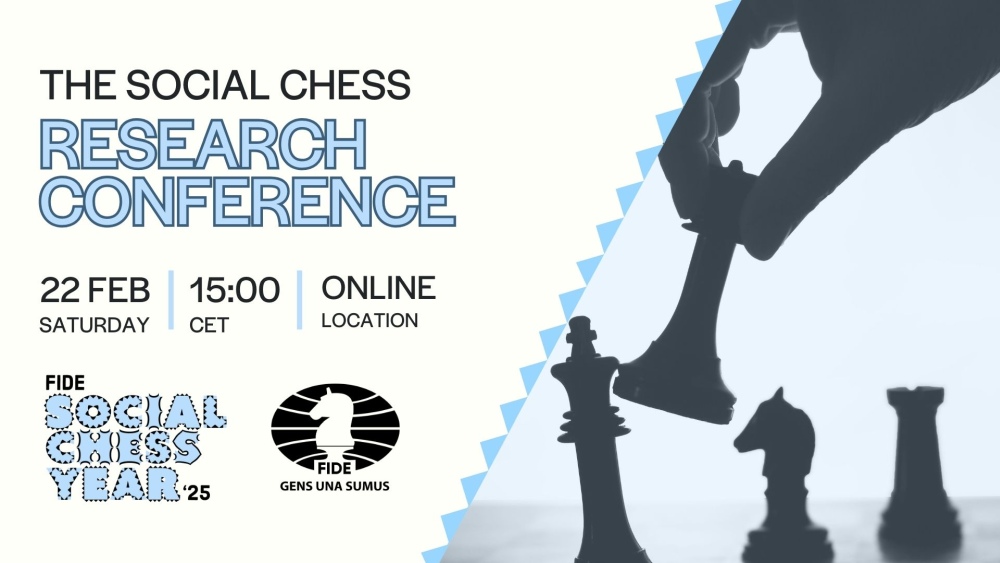
In one of the most comprehensive gatherings of scientists and researchers on the topic of chess, the conference addressed issues such as the role of chess in education and mental recovery. Although chess is widely regarded as a tool for cognitive and personal development, these claims are seldom substantiated by concrete research. With this in mind, the FIDE Social Chess Research Conference—which took place online on February 22—brought together experts in sports and mental health from different health and research institutions worldwide to present their findings and discuss the broader societal role of chess. The conference is part of FIDE’s Social Chess Year initiative, which aims to promote the social value of chess and its importance beyond being just a game, highlighting its role in personal development. Why chess should be considered a sport One of the first issues addressed at the conference was the long-standing debate on whether chess qualifies as a sport. The International Olympic Committee and over 100 countries recognise chess as a sport, though some do not. Prof. Filip Kobiela from the University of Physical Education in Kraków, who has researched the topic, noted that traditional definitions of sport emphasise physical skills, which some argue chess lacks. Kobiela noted that chess demands endurance and quick reflexes—especially in fast formats like blitz—and highlighted chess-boxing as a hybrid of mental and physical competition, challenging ‘narrow definitions of sport’ that overlook chess’s physical aspects. He concluded that a broader, more inclusive definition should consider chess a sport, taking into account its physical elements as well as its institutional recognition by the IOC and numerous countries worldwide. Scientific proof of chess improving cognitive skills One of the key topics discussed at the conference focused on the role of chess in enhancing cognitive skills. Juan Antonio Montero Aleu and Rodrigo Babeito introduced the ECAM Method—a cognitive training approach using chess. The method is applied in various settings, from elderly care to addiction treatment and autism therapy. Its applicability without prior chess knowledge broadens its potential for implementation. According to the researchers, the method aids memory, attention, and executive function training while providing a motivating and engaging way to stimulate the brain. The method is available via the Gym Chess App—a digital version of the ECAM Method featuring over 2,500 exercises designed to train cognitive functions. Speaking specifically on brain and addiction recovery, Prof. Dr. Sabine Vollstädt-Klein from the Central Institute of Mental Health in Mannheim presented her research findings. Her research found that chess enhances cognitive function in both children and older adults, particularly by strengthening their reflective system and improving self-control. It also reduces substance cravings—tested on smokers and individuals with alcohol dependence—and enhances life satisfaction. When chess-based cognitive training was compared to standard treatment, the research found that the chess-infused approach led to greater improvements in attention, executive function, and cognitive flexibility, as well as stronger brain activation in key cognitive areas post-training. The method was integrated with the Gym Chess App and recommends incorporating physical exercise for better cognitive results. Towards future research projects The FIDE Social Chess Research Conference also featured breakout sessions where participants discussed ongoing projects and ideas for future research benefiting chess. Topics included integrating wellness tools for chess and increasing eco-friendly practices and sustainability in chess clubs. FIDE Social Commission Chair Andre Vögtlin thanked the participants of the conference, noting that their contributions are helping chess gain recognition “in the market,” in both the public and private sectors—”as we bring forward concrete evidence of the positive impact of chess on society.”
Zhu Jiner to replace Lei Tingjie in FIDE WGP 2024–25 Series
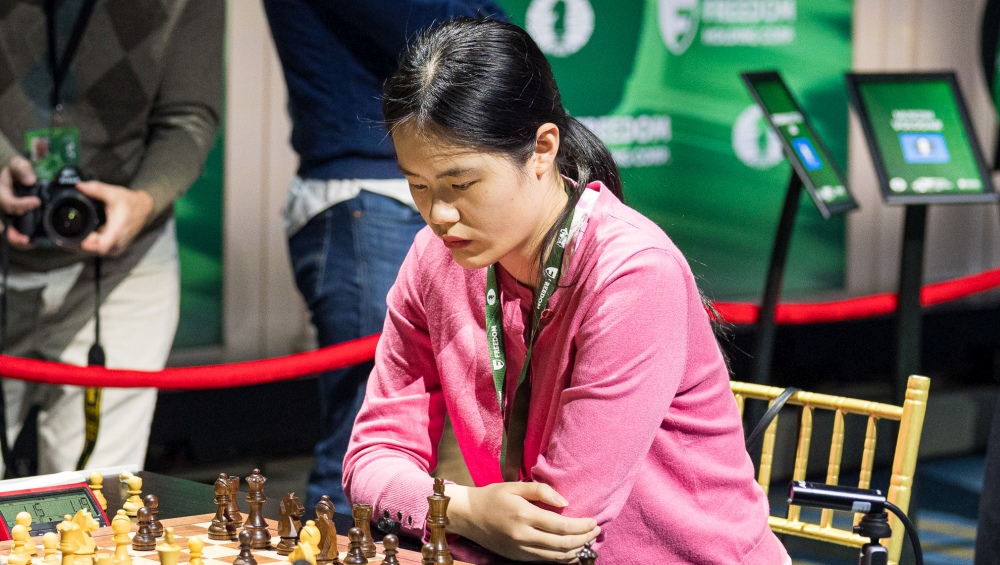
GM Lei Tingjie has withdrawn from the FIDE Women’s Grand Prix 2024–25 for personal reasons. In accordance with WGP regulations, she will be replaced by GM Zhu Jiner (pictured above), who is now set to compete in the FIDE WGP legs in Cyprus, India, and Austria. Zhu Jiner has held the Grandmaster title since 2023 and is currently China’s fifth-ranked female player. She won the Girls’ U14 section of the World Youth Chess Championships in Khanty-Mansiysk in 2016. In 2017, she finished third in the Asian Zone 3.5 behind Zhai Mo and Ni Shiqun, earning qualification for the Women’s World Chess Championship 2018. That same year, she was awarded the FIDE Woman International Master (WIM) title. In 2018, she won the bronze medal at the Women’s China Rapid Chess Championship. Zhu Jiner competed in the first three legs of the FIDE Women’s Grand Prix 2022–23. In Astana, the first leg, she finished third with 6.5/11. In Munich, she tied for fifth place with 5.5/11, and in New Delhi, she tied for first place with Aleksandra Goryachkina and Bibisara Assaubayeva, scoring 6/9. Her performance in New Delhi secured her final GM norm, and in August 2023, she was officially awarded the Grandmaster title, becoming the 41st woman in history to achieve this distinction. The fourth leg of the FIDE WGP 2024–25 will take place in Cyprus from March 14–25, with Zhu Jiner replacing Lei Tingjie in the draw. The full pairings can be found below: FIDE Women’s Grand Prix Cyprus 2025 Pairings (PDF) FIDE WGP official website: https://womengrandprix.fide.com/ Photo: Lennart Ootes
Goryachkina clinches second FIDE WGP 2024-2025 title in Monaco after dramatic finale
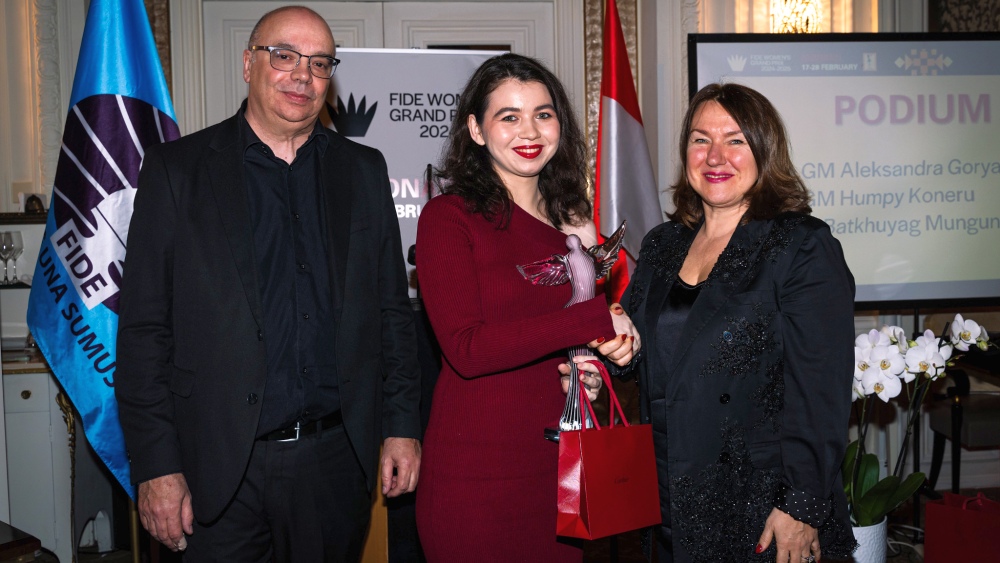
We have reached the end of a spectacular Grand Prix leg in Monaco, filled with intense battles, unexpected turns, and a newly crowned champion. After nine grueling rounds, three players—Aleksandra Goryachkina, Batkhuyag Munguntuul, and Humpy Koneru—finished tied for first place. However, it was Goryachkina who emerged as the tournament winner, securing her second Grand Prix leg victory, thanks to the superiour Sonneborn-Berger tiebreak. The final round delivered high-stakes drama, with Munguntuul and Goryachkina drawing their encounter, allowing Humpy Koneru to join them at the top after defeating Bibisara Assaubayeva. Meanwhile, Alexandra Kosteniuk bounced back with a victory over Elisabeth Paehtz, Tan Zhongyi and Harika Dronavalli drew, and in a shocking twist, Sarasadat Khademalsharieh defeated Kateryna Lagno, dashing her hopes for the title. Yesterday’s results had already reshaped the leaderboard, with Goryachkina and Munguntuul catching up to Lagno, setting up a final-round showdown. The stakes were high: a win in Munguntuul-Goryachkina would likely secure first place for the winner, while Lagno needed a victory against Khademalsharieh to stay in contention. With everything on the line, the last round was a fitting climax to an unforgettable event. Round 9 results Batkhuyag Munguntuul 1/2-1/2 Aleksandra GoryachkinaAlexandra Kosteniuk 1-0 Elisabeth PaehtzTan Zhongyi 1/2-1/2 Harika DronavalliHumpy Koneru 1-0 Bibisara AssaubayevaSarasadat Khademalsharieh 1-0 Kateryna Lagno Batkhuyag Munguntuul – Aleksandra Goryachkina This was the game everyone had their eyes on. The tournament’s bottom seed, Batkhuyag Munguntuul, delivered a phenomenal performance in Monaco, while Goryachkina, the winner of the previous Grand Prix leg, fought her way to the top after an early setback in round one. A victory for either would have secured at least a shared first place, while a draw would have left the final standings uncertain, depending on Lagno’s result. The opening choice—a Berlin Defense in Ruy Lopez—was particularly interesting, as it is known for its drawish tendencies. However, throughout this tournament, we have seen dynamic interpretations of this setup, and this game was no exception. Both players sought complications, but multiple exchanges eradicated any attacking chances, leading to a draw. Goryachkina remains the clear favorite in the overall Grand Prix standings and will play her third and final leg in Cyprus (March 14-25). Will she cement her place at the top? Meanwhile, Munguntuul, who had a tough start in Shymkent but shone in Monaco, will return for the Indian leg (April 13-24). What will her third appearance bring? Alexandra Kosteniuk – Elisabeth Paehtz A King’s Indian Defense quickly turned favorable for White, both on the board and on the clock. Alexandra first advanced on the queenside, securing a strong outpost for her knight, and then took full advantage of Black’s passive pieces and ill-timed counterplay on the kingside. Both players have not had great time management in this tournament, and today they exchanged long tanks – for more than 20 minutes at some points. A key moment came at move 18 when Black faced a recapture dilemma: Kosteniuk noted in her post-game interview that King’s Indian players instinctively want to recapture on f5 with a pawn, but here, Black’s passive position demanded either 18…Bxf5 or 18…Nxf5 instead. After further simplifications, White’s advantage became undeniable due to Black’s misplaced pieces and weak pawn structure. The game concluded with a tactical shot following 36. Bb4, making White’s passed a-pawn a decisive factor. Paehtz, understandably determined to win, took risks, but Kosteniuk—bouncing back from her previous loss—remained composed and converted the advantage. Paehtz started the tournament strongly but lost momentum. However, with her next appearance in Cyprus, she has the opportunity to regain her form. Meanwhile, Kosteniuk will return for the final Grand Prix leg in Austria. Tan Zhongyi – Harika Dronavalli Both players entered the round with confidence after winning their previous games. While neither had a standout tournament, ending on a strong note was crucial—especially for Harika, who will play in Cyprus next, and Tan, who is set to challenge the Women’s World Champion in just four weeks. Tan, trailing the leaders by just half a point, still had an outside chance of winning, making this game all the more significant for both players. It began with a Sicilian but quickly deviated from mainline theory. White appeared more comfortable in the resulting closed position, securing a strong outpost knight. However, her other pieces were passive, preventing any decisive breakthroughs. As the game progressed, Black found chances for a kingside initiative, but the position remained balanced. Eventually, the queenside opened up, leading to multiple exchanges and leaving Black with a passed a-pawn. Dronavalli could have forced a draw by trading queens but opted to continue, given her slightly more active pieces. Despite Black’s winning pawns, the ensuing complications allowed Tan’s queen to remain a constant threat. Ultimately, the game ended in a hard-fought draw. Tan will soon be in China for the World Championship match before returning for the Grand Prix final leg in Austria (May 6-17)—will she compete as the newly crowned World Champion? Meanwhile, Harika, despite an underwhelming performance in Monaco leg, will have two more chances to shine in Cyprus and India. Humpy Koneru – Bibisara Assaubayeva Trailing the leaders by half a point, Humpy had every reason to go all in, and that’s precisely what she did. Her opponent, Assaubayeva, struggling with health issues and sitting at the bottom of the standings, was likely not at her sharpest. An early mistake cost her a pawn, and from there, Humpy dictated the game. Here, instead of 11…c6 or 11…Nh5 Black played 11…Nd7?, allowing 12. Qxd8 Rxd8 13. Nb5, attacking the c7-pawn. Despite being down material early, Assaubayeva fought on, posing as many problems as possible. However, Humpy’s experience prevailed, and she secured a critical victory, joining the tournament leaders. This was Assaubayeva’s final Grand Prix leg, while Humpy will return to compete in India, playing on home turf. Sarasadat Khademalsharieh – Kateryna Lagno Lagno had led the tournament for multiple rounds and played a quick draw on the previous day. But with her co-leaders facing off, she needed a win. Unfortunately, pushing
Boris Spassky (1937–2025)
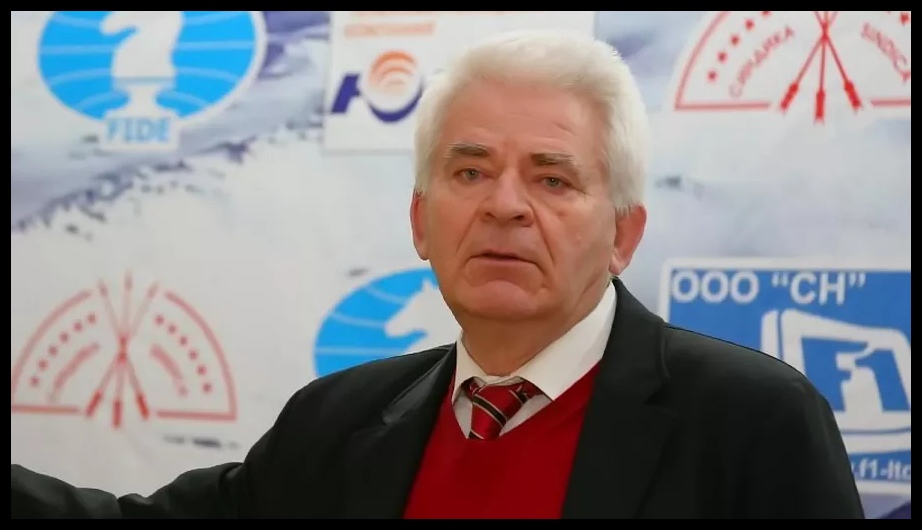
FIDE is deeply saddened by the passing of Boris Spassky, the tenth World Chess Champion, at the age of 88. Spassky was born in 1937 in Leningrad and recognized as a chess prodigy from an early age. He earned the Grandmaster title at 18 and made his Candidates Tournament debut in 1956 (Amsterdam) at 19. Though Spassky showed immense promise, he missed the next two World Championship cycles after failing to qualify for the Interzonals. However, he resumed his quest for the chess crown eight years later. After defeating Keres (1965), Geller (1965), and Tal (1965) in the Candidates matches, Spassky earned the right to challenge Tigran Petrosian for the world title. Though Boris lost the 1966 match in Moscow, he fought his way back and, three years later, defeated Petrosian in their rematch (Moscow, 1969) by a score of 12½–10½, becoming the tenth World Chess Champion. Spassky held the title until 1972, when he famously lost to Bobby Fischer in Reykjavik, one of the most iconic matches in chess history. A symbol of rivalry between the USA and USSR during the Cold War, the “Match of the Century” was held in Reykjavik, Iceland, and boasted a record-breaking prize pool of $250,000, dwarfing other sports’ rewards. The showdown between an American and a Soviet drew unparalleled media coverage, with major outlets present. The match was broadcast to 50 million viewers. The contest lasted 21 games, and Fischer won 12½ to 8½, becoming the eleventh World Chess Champion. This victory propelled chess into the mass media spotlight. Spassky continued competing at the highest level, notably reaching the Candidates semifinal in 1974 and the final in 1977. A two-time USSR Champion (1961 and 1973), Spassky played for the Soviet team in seven Chess Olympiads (1962–1978), winning thirteen medals (team and individual) and scoring 69 points in 94 games (+45−1=48). An independent spirit and true chess artist, Spassky felt constrained by the Soviet system. In 1976, he emigrated to France with his third wife, became a French citizen in 1978, and later represented France in three Olympiads (1984–1988) on board one. In 2012, Spassky returned to Russia. The first genuinely universal player, Spassky was not an opening specialist, but he excelled in complex and dynamic middlegame positions, where he was in his element. FIDE extends its sincere condolences to Boris Spassky’s family, friends, and loved ones.
PDC webinar on 2025 FIDE Funding Guidelines announced

Dear FIDE members, We are happy to announce that FIDE starts its Planning and Development Funding programme 2025 cycle on the 1st of March 2025. All beneficiaries entitled to the funding programme are welcome to submit their requests for 2025 development projects. FIDE PDC has published the new 2025 FIDE Funding guidelines with some adaptations and amendments of 2025 here: https://pdc.fide.com/guidelines2025/. We would like to invite you to the FIDE PDC Webinar initiated to discuss the new guidelines with amendments, new application procedure, format of applying for funds and other important changes related to the FIDE Planning and Development programme and procedure. The FIDE PDC Webinar will take place on March 03, 2025, at 14.00 pm CET via ZOOM platform. Link to the webinar is below: us06web.zoom.us/j/83941940294?pwd=a9WxS5mqbC3q4fPN0saPNqC1RxEF7k.1 Meeting ID: 839 4194 0294Passcode: 801501Topic: FIDE PDC Funding Programme 2025 – start of the cycleTime: Mar 3, 2025 02:00 PM Paris Tap mobile +15074734847,,83941940294#,,,,*801501# US+15642172000,,83941940294#,,,,*801501# US Dial by your location +1 507 473 4847 US• +1 564 217 2000 US• +1 646 876 9923 US (New York)• +1 646 931 3860 US• +1 669 444 9171 US• +1 669 900 6833 US (San Jose)• +1 689 278 1000 US• +1 719 359 4580 US• +1 253 205 0468 US• +1 253 215 8782 US (Tacoma)• +1 301 715 8592 US (Washington DC)• +1 305 224 1968 US• +1 309 205 3325 US• +1 312 626 6799 US (Chicago)• +1 346 248 7799 US (Houston)• +1 360 209 5623 US• +1 386 347 5053 US• +1 408 638 0968 US (San Jose) Meeting ID: 839 4194 0294Passcode: 801501 Find your local number: https://us06web.zoom.us/u/kgAfCsiXP Looking forward to seeing you at the webinar, FIDE PDC Team
WSTCC 2025: USA and England crowned champions

From February 16–27, 2025, Prague hosted the World Senior Team Chess Championship. After over ten days and nine exciting rounds, the champions emerged in every category. 50+ Category Top-seeded USA (GM Ehlvest, GM Kaidanov, GM Shabalov, GM Novikov, and IM Rachels) secured first place in the 50+ competition, finishing with 15/18 points after defeating Confluentia in the final round. Team Italy (GM David, GM Godena, IM Bellini, IM Bellia, and IM D’Amore) also won their last match, equaling the USA’s score but had to settle for silver due to inferior tiebreaks (game points). Kazakhstan (GM Kazhgaleyev, GM Kotsur, GM Temirbayev, IM Tikzhanov, and IM Min), who led the event after eight rounds, faced a tough last-round pairing against England 1. After tense battles on all four boards, the match ended in a draw, leaving Kazakhstan with bronze, while England 1 finished in fourth place. Several players had a truly amazing event and delivered outstanding performances. GM Michael Adams scored 6.5/8 on the top board, only losing to GM Ftacnik in round seven, earning him the gold medal for board one. GM Alexander Shabalov (USA) claimed gold on board three. GM Mark Hebden (England) dominated board four. IM Carlo D’Amore greatly contributed to Italy’s success, winning the reserve board medal. Final standings 50+ England 1 (GM Nunn, GM Flear, GM Kosten, IM Large, and FM Chapman) dominated the 65+ category from start to finish, playing on the top board from round two onwards and conceding only two match draws. Lasker Schachstiftung GK (GM Knaak, GM Jussupow, GM Meister, and Dr. Koehler), the top-seeded team, remained undefeated but managed only five match wins, finishing second. Germany’s Saxonia secured the bronze medal. Final standings 65+ Legendary GMs Rainer Knaak and Artur Jussupow convincingly won their respective frist and second boards. FM Mario Sibilio played amazing chess and delivering exceptional performance on board three. IM Large (England 1), scored an impressive 7/8, becoming the best performer on board four. The medal for the reserve board goes to IM Giffard of France 1. The women’s teams competed in the same pools as the men but were ranked separately. In the 50+ category, Czech Republic claimed gold, finishing ahead of China (silver) and the USA (bronze). In the 65+ category, Latvia took first place, followed by Czech Republic (silver) and Poland (bronze). This event once again proved that age is just a number, but chess is timeless. Follow us on Instagram and Facebook. Official website: https://www.wstcc2025.net/ Photos: Ave Chess and Mark Livshitz
Three-way tie sets up explosive final round at FIDE WGP Monaco
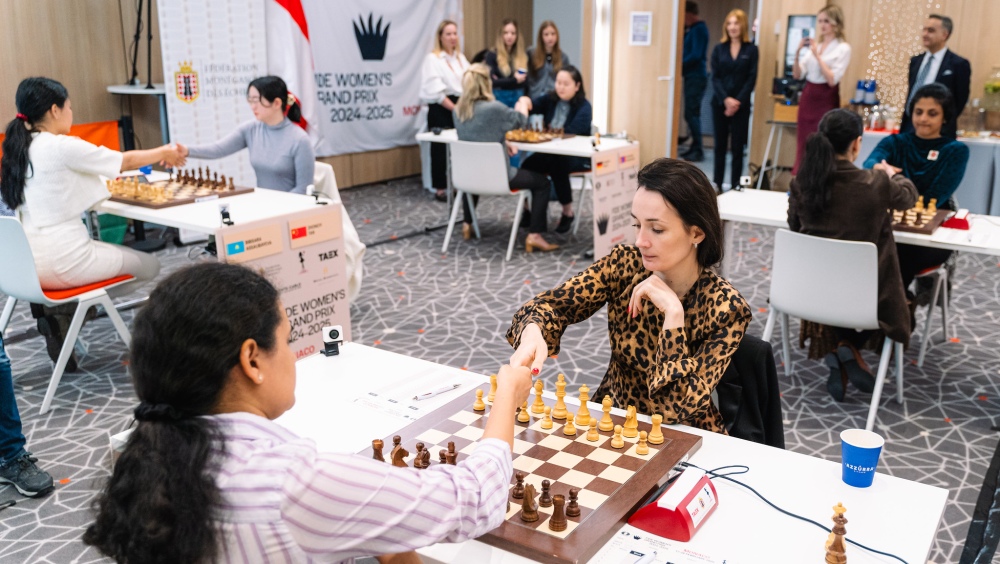
The penultimate round of the FIDE Women’s Grand Prix in Monaco delivered a dramatic spectacle, with four out of five games ending decisively. Goryachkina, Tan, Munguntuul, and Harika all scored victories, setting the stage for a thrilling final round. Three players now share the tournament lead, ensuring an exciting finish. On a lighter note, Bibisara Assaubayeva celebrated her 21st birthday today, receiving chocolates and flowers from the organizers as a thoughtful gift before her game. Virginie Cotta, the General Secretary of Société des Bains de Mer, made the ceremonial first move on her board. Also present today was the Berezovsky chess family—mother Svetlana and daughter Fiorina—who represented Monaco at the FIDE Olympiad last year. It was a pleasure to catch up with them at the event. As the tournament nears its conclusion, fatigue is naturally setting in. Some players opted to conserve their energy, while others fought fiercely for every point. As always, the round featured high-level chess and intense battles across the boards. Round 8 results: Aleksandra Goryachkina 1-0 Sarasadat KhademalshariehKateryna Lagno 1/2-1/2 Humpy KoneruBibisara Assaubayeva 0-1 Zhongyi TanHarika Dronavalli 1-0 Alexandra KosteniukElisabeth Paehtz 0-1 Batkhuyag Munguntuul Aleksandra Goryachkina – Sarasadat Khademalsharieh As often happens towards the end of a tournament, fatigue took its toll on Khadem, who suffered her third consecutive loss. Sarasadat played somewhat passively again, though she still sought to create counterplay, staying true to her fighting spirit. Goryachkina, however, capitalized on her opponent’s weaknesses and demonstrated her trademark consistency, even in the latter stages of the event. Emerging from a closed Ruy Lopez, the game was slow and positional—an environment in which Goryachkina has thrived throughout the tournament. White built up a comfortable position and gradually improved her pieces as Black struggled to generate play. Khadem’s game unraveled as she allowed unnecessary activity, dropped a pawn without compensation, and overlooked tactical nuances, ultimately ceding full control. In a completely lost position, she resigned on move 50. With this victory, Goryachkina joins Lagno and Munguntuul in the lead, setting up a high-stakes final-round encounter against the latter. Kateryna Lagno – Humpy Koneru After a grueling six-hour battle against Zhongyi Tan in the previous round, Lagno opted for a quick draw against Humpy Koneru. Leading the standings by half a point, with Koneru trailing just behind, the decision was pragmatic as she looks to maintain her position heading into the final round. Bibisara Assaubayeva – Tan Zhongyi Unfortunately for Assaubayeva, Tan had no birthday presents to offer over the board. Playing a closed Ruy Lopez, White made a few questionable decisions, allowing Black to dictate the pace of the game. Despite occasional chances to escape, Assaubayeva remained on the back foot, and Tan secured a commanding advantage. The game reached a critical moment after 37…Nxg2, where White’s best option was the dynamic 38.Qxg2 f4 39.Rxe5 Rxe5 40.Rxe5 Rxg3, followed by sacrificing the queen with 41.Rxd5. This would have given White practical chances in a queen vs. rook-and-knight endgame. Instead, White captured on e5 immediately, allowing 38…Nxe1, after which the position was completely lost. The game concluded with 39.Rxd5 Kg8 40.Nxf5 Qa8—Black’s queen attacking the rook and the threat 41…Qa2+ sealed White’s fate. Harika Dronavalli – Alexandra Kosteniuk Dronavalli has steadily regained confidence after her rocky start, and today she finally notched her first win of the event. The game, a King’s Indian Attack with both sides fianchettoing on the kingside, quickly turned sharp as White aggressively advanced on the queenside. The players reached a middlegame with opposite-colored bishops, where White had a far-advanced but isolated c-pawn. Kosteniuk faced an important decision here. A retreat with 25…Bb6 was the safer choice, but she opted for the more natural 25…e5, which, while seemingly strengthening the bishop, but slightly exposed her king exposed. The situation worsened for Black after the pseudo-active 26…f5, opening position even more. A decisive moment came when Kosteniuk moved her king forward 28…Kf6? only to retreat immediately after 29.Bd5 Kg7. Again after the reserved 29…Bb6 Black would have been just slightly worse. Not only did this misstep cost Alexandra a couple of tempi, but she also spent 10 minutes deliberating over the move, leaving herself in time trouble. As played, Dronavalli seized the moment with the spectacular 30.Rxd4!, a thematic sacrifice exploiting Black’s open king. White continued with precise play, dismantling Black’s kingside defenses and clinching a much-needed victory. Elisabeth Paehtz – Batkhuyag Munguntuul This was undoubtedly the game of the round, as underdog Munguntuul struck at a crucial moment to join the leaders. The game, a Semi-Slav, quickly veered off mainline theory, and Paehtz initially seemed to have the upper hand with an active position and a dominant outpost knight on d6. The tide shifted when Paehtz played 27.Ne4 (27.Rd1 was a more natural and stronger option), allowing Black’s rook to establish itself on d5, equalizing. After 28.a5 Munguntuul upset the balance with an interesting practical sacrifice 28…Bxe5! The engines may not fully agree with this move but it presented White with some problems. Paehtz’s biggest mistake came here. White needed to play 33.Rg1 to ensure back-rank safety, but instead, she played 33.Re1? allowing 33…Qc3! After 34.Qxc3 bxc3 35.Rec1 c2 36.h3, it was too late, and 36…Rd1 sealed her fate. Though Paehtz briefly created counterplay with a passed a-pawn, Munguntuul remained composed, converting her kingside pawn two-pawn advantage into a well-earned victory. This incredible performance places her among the tournament leaders—an impressive feat in what is shaping up to be the best event of her career. With three players—Lagno, Goryachkina, and Munguntuul—now sharing the lead, the final round of the FIDE Women’s Grand Prix in Monte-Carlo promises a dramatic showdown. Don’t miss the action—tune in for the final round and witness history unfold! Standings after Round 8: Kateryna Lagno – 5Batkhuyag Munguntuul – 5Aleksandra Goryachkina – 5Humpy Koneru – 4.5Tan Zhongyi – 4.5Alexandra Kosteniuk – 3.5Harika Dronavalli – 3.5Bibisara Assaubayeva – 3Sarasadat Khademalsharieh – 3Elisabeth Paehtz – 3 Round 9 pairings and dates The ninth and final round of the third leg in the

